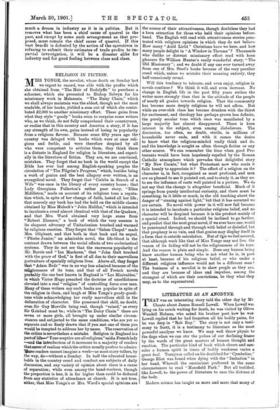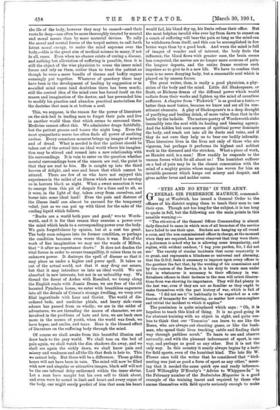LITERATURE AS AN ANODYNE.
rilHAT was an interesting story told the other day by Mr. Choate about James Russell Lowell. When Lowell was lying on his couch waiting for death, he was visited by Olives Wendell Holmes, who asked his brother poet how he was Lowell replied that he had forgotten all his bodily pains, for he was deep in "Rob Roy." The story is not only a testi- mony to Scott, it is a testimony to literature as the most powerful anodyne we know. We may well throw physic to the dogs when we can stir the pulses of our declining frame by the words of the great masters of human thought and emotion. The particular kind of book which cheers and een- soles a human spirit in times of bodily weakness varies a great deal. Tennyson called on his deathbed for " Cymbeline," George Eliot was found when dying with the "Imitation" in her hand, Whewell the omniscient preferred in the same circumstances to read "Mansfield Park." But all testified, like Lowell, to the power of literature to ease the distress of the body.
Modern science has taught us more and more that many of the ills of the body, however they may be caused—and their roots lie deep—can often be more thoroughly treated by mental and moral means than by mere material devices. To rally the moral and mental forces of the torpid nature, to call forth latent moral energy, to make the mind supreme over the body,—this is the great aim of medical science in many, if not in all, cases. Even when no chance exists of curing a disease, and nothing but alleviation of suffering is possible, then it is still the object of the wise physician to rouse the inner mind forces and rely on them, rather than to treat the patient as though he were a mere bundle of tissues and bodily organs cunningly put together. Whatever of quackery there may have been in the development of healing by suggestion or in so-called mind cures (and doubtless there has been much), still the central idea of the mind cure has forced itself on the reason and imagination of the doctor, and has persuaded him to modify his practice and abandon practical materialism for the doctrine that man is at bottom a soul.
This, we suppose, is the reason for the power of literature on the sick-bed in leading men to forget their pain and live in another world than that which seems to surround them. Medicine cannot effect this. We administer drugs faithfully, but the patient groans and tosses the night long. Even the most sympathetic nurse too often finds all power of soothing useless. Every conscious moment brings up images of misery and of dread. What is needed is that the patient should be taken out of the actual into an ideal world where his imagina- tion may be stirred and roused into a new relationship with his surroundings. It is vain to enter on the question whether mental surroundings born of the unseen are real, the point is that they are real to him. He is caught up into the third heaven of delight, and sees and hears that which cannot be uttered. There are few of us who have not enjoyed this experience in the midst of an illness which seemed to envelop us in horrors black as night. What a sweet sensation it was to emerge from this pit of despair for a time and to sit, as it were, in the light of day, taken away from ourselves, and borne into some ideal land! Even the pain and distress of the illness itself can almost be excused for the temporary relief, just as we can put up with thirst for the sake of the cooling liquid which follows.
"Books are a world both pure and good," wrote Words- worth, and it is for that reason they exercise a power over the mind which leads to a corresponding power over the body. We gain forgetfulness by opiates, but at a cost too great. The body soon relapses into its former condition, or perhaps the condition becomes even worse than it was. But of the work of fine imagination we may use the words of Milton, that "it after no repentance draws." It does not deaden the vital forces in order to secure tranquillity, it raises them to an unknown power. It destroys the spell of disease so that it may place us under a higher and purer spell. It takes us out of the actual world, not that it may drug our senses, but that it may introduce us into an ideal world. We are absorbed in new interests, but not in an 'unhealthy way. We thread the forest of Arden with Rosalind, we tramp along the English roads with Jeanie Deans, we are free of the old haunted Pyncheon house, we enter with breathless eagerness into all the. details of Crusoe's strange dwelling, we weep over filial ingratitude with Lear and Goriot. The world of dis- ordered beds, and medicine phials, and heavy sick- room odours has passed from us wholly; we are in the midst of adventures, we are threading the mazes of character, we are involved in the problems of hate and love, we are back once more in the scenes of youth, when the world was fresh, we have hopes, and smiles, and tears. Here is the blessed effect of literature on the suffering body through the mind.
Of course we shall awake from this beautiful illusion and draw back to the grey world. We shall toss on the bed of pain again, we shall watch the dim shadows die away, and we shall see again the sickly dawn, we shall know pain and misery and weakness and all the ills that flesh is heir to. This we cannot help. But there will be a difference. Those golden hours will not have been in vain. The mind will now be filled with new and singular or attractive images, black self will not be the one infernal deity enthroned within the inner shrine. Let a man have naught but his own self to think about,, and even were he sound in limb and heart and every organ of the body, one might surely predict of him that soon his heart would fail, his blood dry up, his limbs refuse their office. But the most helpless invalid who ever lay from dawn to sunset on a couch of suffering will bear the pain so long as the mind can be withdrawn from itself, and this can be accomplished in few better ways than by a good book. And when the mind is full of images of wonder and of interest, the body feels the influence, the blood flows with greater ease, the brain seems less congested, the nerves are no longer mere avenues of pain, the languor departs, and the entire frame receives such impulses as to give to it a new life. We have to confess that man is no mere decaying body, but a reasonable soul which is played on by unseen forces.
The great writer, then, is really a good physician, a phy- sician of the body and the mind. Little did Shakespeare, or Scott, or Dickens dream of the diffused power which would radiate from their works and lighten up the mind of countless sufferers. A chapter from " Pickwick " is as good as a tonic,— better than most tonics, because we know and see all its con- stituent elements. A play of Shakespeare's is a deep draught of purifying and healing drink, of more value than that in the bottle by the bedside. The nature-poetry of Wordsworth sinks insensibly into the soul with its healing and blessing agency. And the hidden but sure sources of spiritual power dominate the body, and reach out into all its ducts and veins, and if they do not cure they help us to bear our bodily infirmity. Thus literature lives in the lives not only of those who are vigorous, but perhaps it performs its highest and noblest work in the diseased and the stricken. What a piece of work, as Hamlet said, is a man! How readily he responds to the unseen forces which lie all about 1113 ! The humblest sufferer on a bed of pain may be in the closest communion with the mind of a mighty genius whose magic has woven for him an invisible garment which keeps out misery and despair, and gives nobler loves and nobler cares.







































 Previous page
Previous page